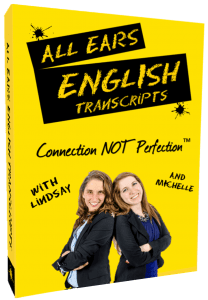
Have you heard people use the phrase “wouldn’t you know it” in English?
Do you often feel a bit confused by the usage of the word “would” or “wouldn’t?” This may involve some English grammar but we’re going to stick to grammar that is useful and that you can use immediately.
If you aren’t sure of the various uses for the words, then you want a bit of clarification.
We’re going to look at these words, how they work in conversation, and some helpful ways to use these common phrases in English.
Get Your Transcripts Today!

Make sure you understand every word you hear on All Ears English.
Bring your English to the advanced level with new vocabulary and natural expressions.
Subscribe and get the transcripts delivered by email.
Learn to speak naturally with the American accent.
Click here to subscribe and save 50%
A listener asked about this on Instagram that will be helpful to review.
Hi ladies,
I just love your show and I listen to it all the time! I have a question about a phrase that I heard and how it should be used. I’ve heard people say “wouldn’t you know it” and I’m not sure I totally understand it.
Can you help me to understand what this means and how it’s used? I could also really use your help with the word “would” as well.
Thank you very much!
Sharhzrad
Some Background On This
This is a great question from the listener, because “wouldn’t you know it” comes up often in conversation.
This phrase essentially means you’re surprised or you can’t believe it.
This is usually referring to something that happened or something that you were caught off guard by or surprised by.
We have done a couple of episodes on this in the past that can be quite helpful to review for reference.
Check out the following episodes for reference and more about this concept.
- Keep Your Audience Focused On You! Spice Up Your Stories
- We have done a lot with the word “would” such as in this episode: Would You Attend A Fake Wedding? How To Voice Your Opinion In English
- What Would Make Your Day? How To Use This Phrase To Describe What Brings You Happiness
As you can see there are so many uses for this word.
These episodes will prove to be great points of reference, and they can give you great starting points with learning about how to use this word.
Uses For This Word In Conversation
The word “would” is used in so many different aspects of conversation.
Understanding how it is used and what the various ways are to use it can be really helpful.
Though it may seem confusing that this word is used so much, understanding some of the uses will help you tremendously.
- Hypothetical situations: It’s something that you are speaking about in theory or in a way that says that you’re putting thought into it. You may have wished for this or considered it, and so you are now talking about it in a proactive or wishful way. You might say “They would order 10 cars if they had the money!”
- Ordering at a restaurant: This works well when you are talking about what you would like. You are placing your order and therefore speaking up for your choice in this setting. You might say “I’d like the chicken sandwich please!”
- Talk about the past: This is talking about something that may have happened previously. You would use “would” for something that did happen, and then use “wouldn’t” for something that didn’t happen. There are always things that happened or didn’t happen in the past that you can talk about. If you are talking about something that did happen, you could say “When I was a kid, I would pretend I was a teacher.” If you were talking about something that didn’t happen, you could say “He was so angry that he wouldn’t even talk to me.”
In general would is used in the following way: would + base verb.
You could say something like “I would like the steak.”
Try to remember this rule for usage, and then try out the examples above in how to put it into conversation.
Focusing On Wouldn’t In Phrases
We’re looking at a basic overview so that you know how to use this word in conversation.
As is the way with all things within AEE, we like you to learn things in chunks.
So today we’re going to do phrase and chunks with the word “wouldn’t” as a starting point.
This is a word you will find often gets neglected because you likely tend to fous only on the word “would” first and foremost.
So let’s take a look at how you might use “wouldn’t” in conversation, and how this can work for you.
- I wouldn’t put it past someone: This is essentially saying that you believe that someone would do something. They may have done things like this in the past, and so you wouldn’t be surprised if they did it again. This isn’t usually a positive, though the tone you use with it matters greatly. You could say something like “Did she really skip class?” “I wouldn’t put it past her. You know she hates school.”
- Wouldn’t be surprised: This is similar to the last one, but it can be much more general in nature. This is something that you can use when referring to almost anything that you don’t find to be surprising in nature. You could say “Is it going to snow tomorrow?” “I wouldn’t be surprised. The weather has been so unpredictable that nothing will shock me now.”
- Someone wouldn’t hurt a fly: This is saying that this person wouldn’t do anything to hurt anybody. They are very kind or gentle in nature. They are the last person you would expect to do something unkind or hurt anybody in any way. This doesn’t necessarily mean hurt physically, but it can be emotionally or mentally too. It just speaks to their kind nature overall. You might say “I think Paul said some pretty rude things about his boss today.” “Are you kidding? No way. He’s so nice. He wouldn’t hurt a fly!”
- I wouldn’t count on it: This means that you don’t hope for something or expect it. You may wish for it or hope for it, but you’re just not sure it will actually happen. You might say something like “Do you think the noise will stop soon?” “I wouldn’t count on it. These people party until 3am at least!”
These are some of the more common phrases using the word “wouldn’t” in conversation
You are likely to hear these a lot, and so it can be quite helpful to know what they are and how they are used.
Practice using them so you can see how these phrases work and feel.
Roleplay To Help
Since this is a word that is used so often in conversation, a roleplay can be quite helpful.
In this roleplay, Lindsay got her phone stolen in class and she and Michelle are trying to guess who did it.
Lindsay: “So I came back and wouldn’t you know it? My phone was gone!”
Michelle: “Oh no! Who do you think took it?”
Lindsay: “I wouldn’t put it past Emily. She likes playing jokes–maybe she will give it back tomorrow.”
Michelle: “I wouldn’t count on it. I don’t think someone takes a phone for more than 5 minutes if they are just joking.”
Lindsay: “You think it’s really gone?”
Michelle: “I wouldn’t be surprised. But you never know. Ask around and go to lost and found!”
Lindsay: “You’re right. Besides, Emily is a practical joker but she wouldn’t hurt a fly.”
Takeaway
Would is an extremely dynamic word. Don’t be intimidated by this aspect of English grammar.
We went through some basics today so that you can see some of the more common uses for this word.
Listen for these usages in conversation, and learn in chunks and expressions. If you are taking IELTS this will come in handy on the Speaking test because you’ll be able to form creative and unique expressions.
We started with focusing on wouldn’t, but there is so much more to learn in this area.
This is one of those words you will hear and use often, and so you want to learn and practice with it a lot.
If you have any questions, please leave them below in the comments section.
We’ll get back to you as soon as we can.








